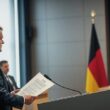Germany’s Fixed-Price Ticket Mechanism Faces Complex Negotiations
The German government and state transport ministers are accelerating efforts to establish a permanent pricing mechanism for the Deutschlandticket, a subsidized public transport pass, aiming for an agreement before the spring ministerial conference.. While the immediate financial framework for 2026 remains settled, the creation of a system guaranteeing affordability beyond that date is proving to be a delicate balancing act, fraught with political and logistical challenges.
The proposed fixed-price mechanism, intended to shield the ticket from the volatility of rising costs, is currently under intense scrutiny. Bavarian Transport Minister Christian Bernreiter emphasized the complexity of integrating various cost factors, including personnel expenses, energy price surges and general inflation, into a fair and sustainable formula. The need to account for a broad range of variables suggests a potentially protracted negotiation process, demanding a nuanced approach that considers the diverse economic realities across Germany’s states.
Significantly, the government appears committed to involving local authorities and transport associations in the indexation process – a move lauded by some as essential for ensuring the mechanism’s legitimacy and practicality. This inclusive approach, however, raises questions. The potential for disparate interests and demands from local stakeholders could further complicate the effort and potentially lead to compromises that dilute the overall effectiveness of the fixed-price scheme. Critics argue that an overly complex, stakeholder-influenced formula risks being less transparent and susceptible to political maneuvering.
Federal Transport Minister Patrick Schnieder echoed the government’s commitment to securing the long-term viability of the Deutschlandticket, characterizing the forthcoming mechanism as providing a “predictable foundation” for its continuation. Schnieder also highlighted the untapped potential within the system, particularly concerning the expansion of the “Jobticket” program – a scheme offering discounted tickets to employees. This, however, adds another layer of complexity as the expansion could necessitate further subsidies and adjustment of the pricing model, potentially straining resources.
The push for a fixed-price mechanism reflects the political sensitivity surrounding the Deutschlandticket. Initially introduced as a temporary measure to ease the economic burden on citizens amidst rising inflation, its popularity has cemented its position as a cornerstone of social policy. While the long-term financial implications remain an area of concern, the government’s commitment to its continuation underscores the political imperative to ensure affordable public transport remains accessible to all Germans. The coming months will be crucial in determining whether a workable and equitable pricing model can be forged, or if political pressures ultimately compromise the original intent of the scheme.





